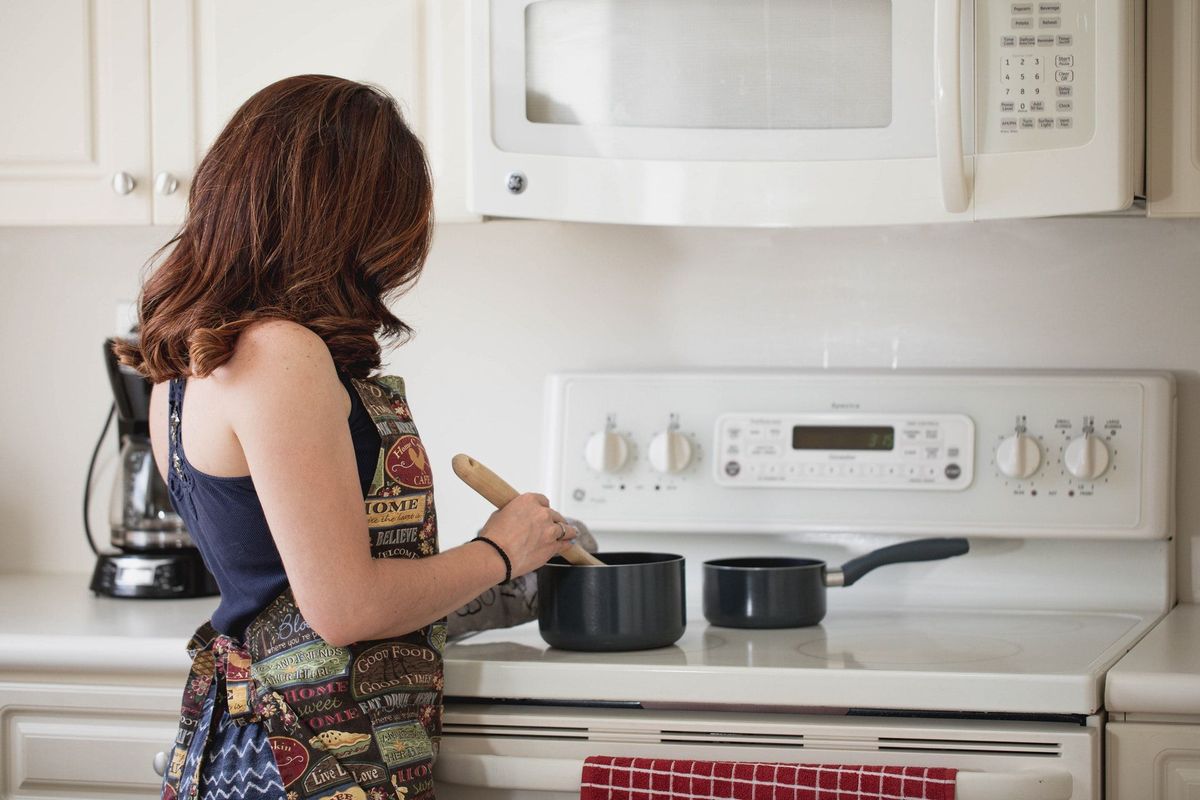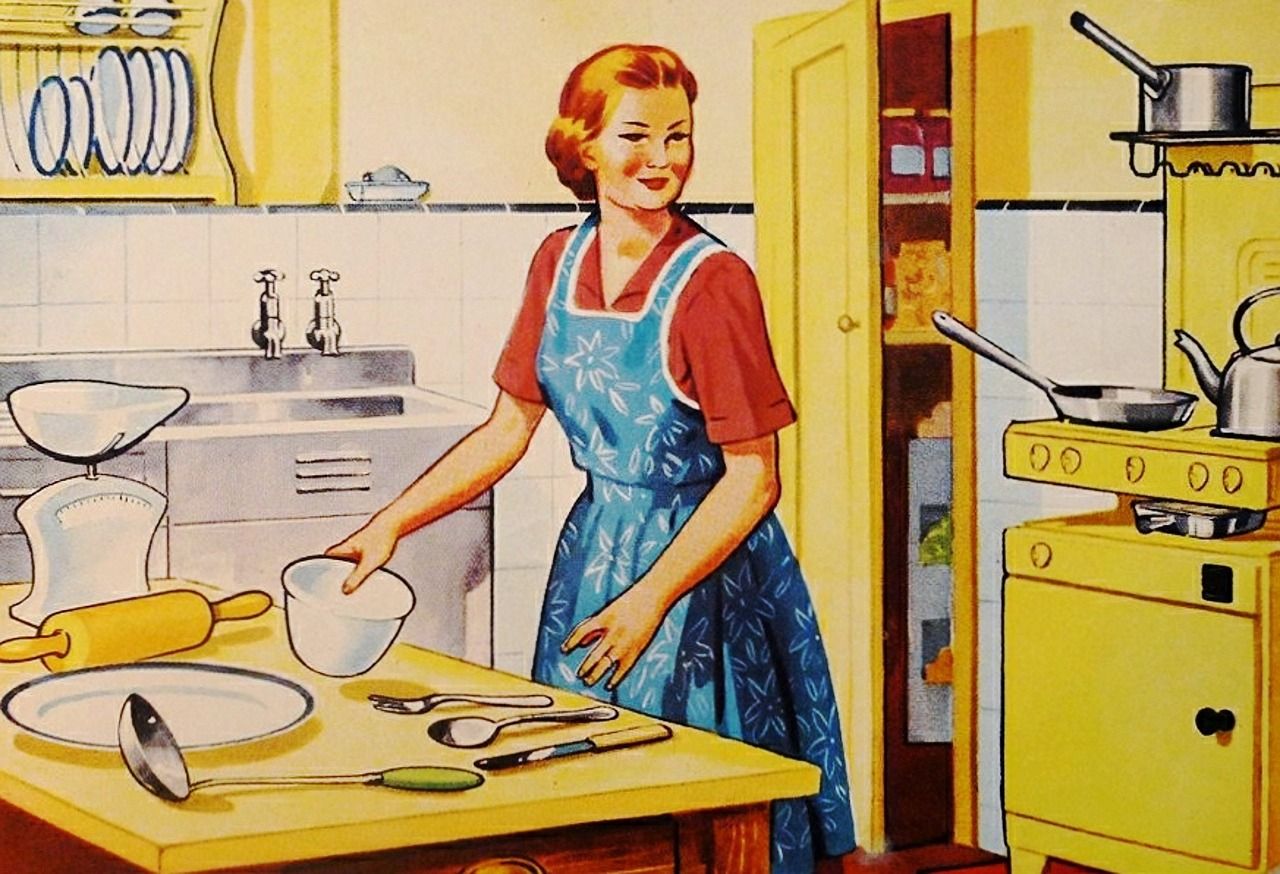The Rise of the "Tradwives", and Choice Under Patriarchy
What does choosing traditional gender roles really mean for women?

Today I woke up to a BBC story about “Tradwives,” or women who choose to be traditional housewives. Tradwives take their household responsibilities to the extreme: they marry, look after a house, and prioritize the professional needs of their husbands above all else.
According to an article in The Mirror, Alena Kate Pettitt, the woman featured on the BBC story, said that “after joining social media she discovered an underground movement of women who felt the same pull to a more traditional life.” There are online forums and tutorials, articles and courses on how to become “the perfect British housewife,” and even a hashtag. Women are proudly choosing to be housewives.
Or are they?
I started thinking more about the article later, when I went to get some water. The sun was brightening up the living room, and the floor looked quite dusty, so I grabbed a broom.
While sweeping the floor, some thoughts hit me. I don’t actually “hate” doing household chores. But I know the reason. It’s because I come from a humble background. I lived for many years in a house that didn’t have tiling on the floor, so you couldn’t sweep it like you do on a tiled/wooden floor. Our house also had many walls showing the bricks, no plaster. Sometimes, no wardrobes – clothes would be stacked on a chair. No washing machine: we had a washing board to do hand-washing only.
I can perfectly understand how someone who has lived under such circumstances might actually later “enjoy” doing household chores. It might provide a sense of achievement to be able to actually have a clean/tidy house – especially if they are now homeowners. It’s even logical.
But the woman on the BBC story didn’t go through this. She did come from a family raised by a solo mother, though. In the BBC report, Pettitt states, “I grew up in a single-parent household. My mum had to go out to work. The home became this huge burden on her and I suppose at that point in time I probably identified that I didn't want that same life.”
In another interview she stated:
“Sadly, I did see first-hand the additional pressures that working outside the home and then having to “catch up with housework” on the weekends put on my mother. I also felt sadness because of the lack of my mother’s presence in the home. Those memories only fortified my decision to stay at home.”
Pettitt saw how hard it is for women to juggle the demands of both work and raising a family. She was also personally hurt by her mother’s absence, so now she wants a different life for herself and her children. That makes sense.
I was raised by a solo mother too, but I didn’t feel abandoned. To make ends meet, my mother bought a sewing machine and learned how to make clothes through sewing magazines. We all knew that she liked to be able to enjoy time with her children too – she would work mostly while we were at school and after we went to bed, and spent plenty of quality time with us. I never felt abandoned.
But it wasn’t a choice for my mother either. She was fired from a job after getting pregnant with her second child and never got another job. When she was pregnant for the third time – that’s me – she decided to leave the big city and take us to the countryside. There, formal jobs, contract jobs, were even harder to find. But people were still pretty much doing most things “old-style” – like buying fabric and hiring a seamstress to make clothes.
Which was not, in turn, by choice either. In the 1980s, most people in Brazil could not afford pret-a-porter clothes. I bought myself my first T-shirt when I was ten years old, in 1987 – my mother's sewing machine didn’t work the stretchy kind of cotton fabric used in T-shirts. We helped with her work – my older sister and I were in charge of sewing on buttons and hems. In exchange, we would get a few coins for each job done. I saved up for months to buy that T-shirt. It was light yellow and had a duck on it.
Based on the stark reality for women in patriarchal societies, where most women around the world are stripped of opportunities from birth, can we consider becoming a tradwife to be a true choice?
But what is choice for women, anyway?
Is it when you have a range of options available and you choose one/some, based on your preferences built from your personal life experiences?
If so, to be a tradwife is not a choice at all for most women who find themselves in traditional gender roles. Around the globe, children are still forced into marriage. Can we really propose, knowing this reality, that these girls, forced to be married young, can choose not to be traditional wives?

The woman in the BBC report claims to have chosen to be a tradwife because she “spent her 20s working in a high-flying job marketing job in London… and trying to climb the career ladder.” She was working long hours, wasn’t being paid a lot of money, and felt her work was completely diminished by her bosses. In the home, she feels valued.
She was overwhelmed by the demands to juggle work, a house, kids, a relationship, a social life, and community service all at the same time – as her mother did.
According to the 2019 annual American Time Use Survey, women spend most of their time outside work looking after a house and/or their children. The research concluded that men, including fathers, get four hours downtime per day, while working mothers devote only 15 minutes to relaxing time.
Ironically, Pettitt has now founded the Darling Academy, a business where she teaches other women to be better housewives – perhaps tradwivery alone was not as fully satisfying as she thought it would be.
Rather than moving back to traditional gender roles, then, wouldn’t a better solution be to make life not so damn hard for women? Would first-world women really “choose” to be tradwives if they could find work where they are valued and respected that pays them fairly, all while not interfering with the demands of their family? There are policies that could help with this, like fair pay, guaranteed parental leave, and universal childcare. But women aren’t a priority to policymakers, so policies continue to incentivize “choices” like tradwivery.
As a matter of fact, quelle surprise, I am a housewife myself. Definitely not by choice, though. I moved countries multiple times to be with my long life partner. I ended up not having the professional qualifications for formal work, starting with knowing the local language. I resort to paid remote work in the two languages in which I’m proficient, writing pieces like this.
Liberal feminism has long viewed women’s actions through the lens of choice: if a woman “chooses” something, that is a feminist act. Many of the actions women “choose” to survive under patriarchy are not made without weighing the benefits or consequences of those choices. The choices, then, become more imposition – a simple, logical, cost-benefit-analysis in a world where women are coerced into traditional gender roles. Yet, even liberal feminists acknowledge that choice when coerced is not freely given. Maybe it’s time to apply the same understanding to tradwives.
The generous support of our readers allows 4W to pay our all-female staff and over 50 writers across the globe for original articles and reporting you can’t find anywhere else. Like our work? Become a monthly donor!
Enter your email below to sign in or become a 4W member and join the conversation.
(Already did this? Try refreshing the page!)





Comments